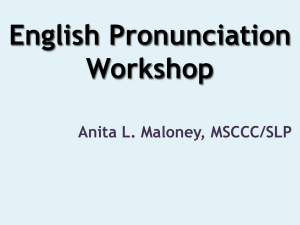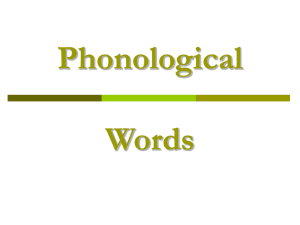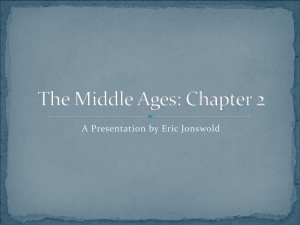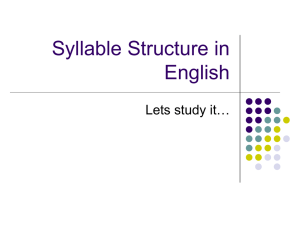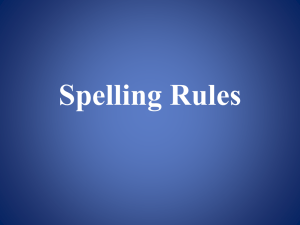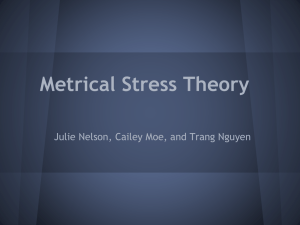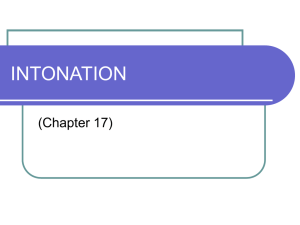lecture 6 - Faculty of Arts, HKBU
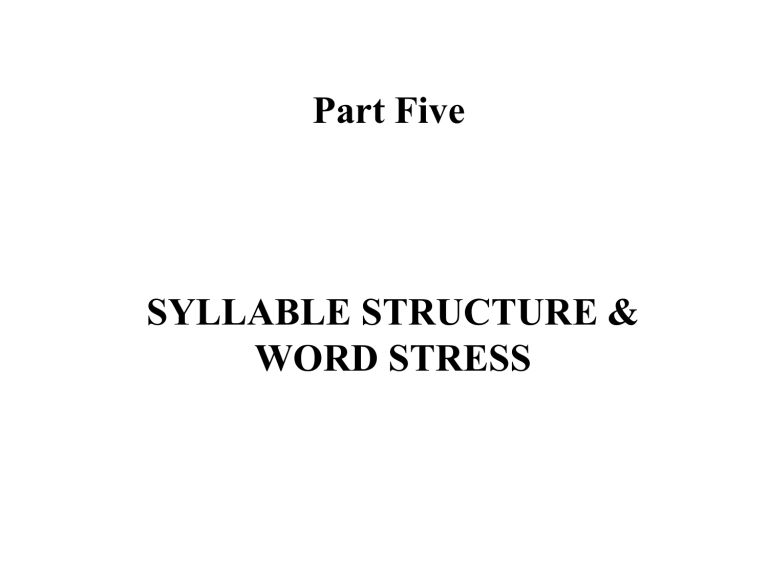
Part Five
SYLLABLE STRUCTURE &
WORD STRESS
Supra-Segmental Phonology:
Phonology above the level of ‘segments’ (sounds)
Units: syllable, word, phrase, etc.
Processes: stress, rhythm, tone, intonation , etc.
THE SYLLABLE
Why do we need the concept ‘syllable’?
Which of the following sequences of sounds are impossible in English?
If [bm], [zn] etc. are impossible sequences in English, then why are the following words (containing these sequences) possible?
a) [hau] (Mandarin) [kau] (Cantonese) b) *[haup] (M) *[kauts] (C)
But why are the following possible?
Why do these names translate into more syllables in
Chinese than in English?
Rob = luo bu Steve = si ti fu Clinton = ke lin dun
Comparing syllables in English and German:
The English syllable :
Question: What must a syllable in English consist of, at the very least ?
THE PARTS OF A SYLLABLE
1) Nucleus
: the indispensable ‘core’ of a syllable
2) Onset: the consonant(s) preceding the nucleus
3) Coda: the consonant(s) following the nucleus
The nucleus and coda together make up the rime
SYLLABLES IN CHINESE : a) CANTONESE
QUESTION: What differences in syllable structure can you see in these dialects?
INVESTIGATING THE STRUCTURE OF THE
SYLLABLE IN ENGLISH
spl spr spj str stj skl skr skj skw smj snj
Generalisations: C1 C2 C3
In a 3-segment onset,
C1 can only be ____________
C2 can only be ___________
C3 can only be ____________
pl pr pj tr tj tw kl kr kj kw mj nj spl spr spj str stj skl skr skj skw smj snj
sp st sk sm sn sl sj sw spl spr spj str stj skl skr skj skw smj snj
In a 3-segment onset, C1 can only be [s]
C2 can only be a [+stop]
C3 can only be an approximant ([+son –stop]) spl spr spj str stj skl skr skj skw smj snj
Observation: C2 must be [+stop] only if C1 is filled.
Suppose we change C2 to: ‘C2 is an open slot’
Condition: If C1 is filled (i.e. by [s]), then C2 can only be a [+stop]
ENGLISH WORD STRESS
In the following words, which syllables are stressed , and how do the stressed syllables differ phonetically from the unstressed?
Analysing stress-assignment rules
Example from Spanish: ha'blar, mu'jer, ver'dad, tempo'ral, capi'tal speak woman truth temporary capital
'hablo, 'casa, impor'tante, son'risa, presi'dente speak house important smile president
Generalisation:
In Spanish, stress falls on the _______ syllable of the word if ______________________________________,
Otherwise, it falls on the __________ syllable.
USEFUL CONCEPTS:
' closed syllable' - one ending in a consonant
' open syllable ' - one ending in a vowel
E.g. the last syllables of hablar and verdad are closed, but the last syllables of hablo and casa are open
Generalisation:
In Spanish, stress falls on the final syllable of the word if it is a closed syllable; otherwise, stress falls on the penultimate (second-to-last) syllable.
STRESS IN SUFFIXED WORDS IN ENGLISH
DATA SET 1:
-ic
'athlete -> ath'letic
'system -> sys'temic
'phoneme -> pho'nemic
'microscope ->micro'scopic ca'tastrophe ->catas'trophic
-ity
'tranquil -> tran'quility
'stupid -> stu'pidity
'fluid -> flu'idity
'uniform -> uni'formity senti'mental ->sentimen'tality
GENERALISATION: For words ending in suffixes like
–ic or ity, the stress falls on:
__________________________________
DATA SET 2:
-ate
'generate
'delegate
-tude
'multitude
'solitude com'municate 'attitude as'similate si'militude pro'pitiate ine'xactitude
GENERALISATION: For words ending in suffixes like ate or -tude, the stress falls on:
____________________________________
DATA SET 3: a) stem
1.
'suicide
2.
'detriment
3.
'sentiment
4.
'anecdote
5.
'universe
6.
'dialect b) stem
1.
'magic
2.
'music
3.
sen'sation
4.
'medicine
5.
'origin
6.
pro'fession stem + al sui'cidal detri'mental senti'mental anec'dotal uni'versal dia'lectal stem + al
'magical
'musical sen'sational me'dicinal o'riginal pro'fessional
IMPORTANT CONCEPTS:
Heavy syllable -- a syllable with a complex rime, i.e. containing either (i) a short vowel plus one or more consonants in the coda (as in bet [bet] and best
[best]), or (ii) a diphthong or long vowel , with or without a coda (as in bay [bei], bait [beit], bee [bi:], beast [bi:st]).
Focus on the penultimate syllable in terms of ‘light’ or ‘heavy’:
SET I
SET II
MONOSYLLABIC WORDS IN ENGLISH
A B C D
Generalisation: Only _______ syllables can stand on their own as words.
STRESS IN SIMPLE WORDS
(i) A o'bey po'lite hu'mane re'ly ad'mire
B tor'ment col'lapse dis'gust e'xist at'tract
C
'utter
'happy
'angry
'carry
'murder
(ii) A o'bey
B C tor'men(t) 'utter po'li(t)e col'lap(se) 'happy hu'ma(n)e au'gus(t) 'angry re'ly ex'is(t) 'carry ad'mire at'trac(t) 'murder
D
'gallop
'promise
'normal
'exit
'rapid
D
'gallo(p)
'promi(se)
'norma(l)
'exi(t)
'rapi(d)
OTHER USEFUL CONCEPTS
‘extrametrical’ -- i.e. ignored by (or 'invisible' to) stress-assignment rules
English Stress Rule ( ESR ):
‘Stress the final syllable of a word if it is heavy; otherwise, stress the penultimate syllable.’
Consonant Extrametricality ( CE ):
‘The final consonant of a word is extrametrical
VERB in'crease ex'port re'cord sur'vey sub'ject
NOUN
'increase
'export
'record
'survey
'subject re'ject con'flict ad'dict con'test
'reject
'conflict
'addict
'contest tor'ment ac'cent
'torment
'accent com'pound 'compound
GENERALISATION: For purposes of stress assignment, the final syllable of a noun is ________________________________
MORE NOUNS
QUESTION: How do we explain the above stress assignments, using the concepts we’ve arrived at so far?
